340 Cruelty
CRUELTY HAS A HUMAN HEART
by David Hancock
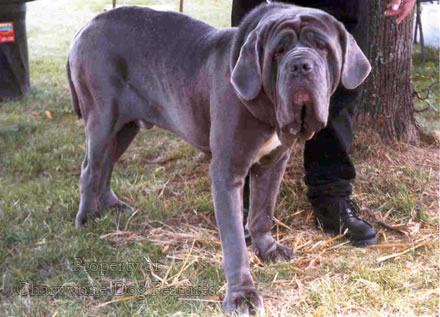 William Blake, writing in the early part of the 19th century, wrote a poem which contained the line: Cruelty has a human heart. I sometimes recall those words when I read yet another case of human cruelty towards dogs. Cruelty can of course take many forms, both direct and indirect. It is rare nowadays, thankfully, to see someone beat a dog in public; in the Victorian era it was not. It was less likely then however for someone to inflict an early death on a dog through over-feeding than it is now. Both are forms of cruelty and both emanate from the human heart. A pet dog can so easily die from the unchecked over-kindness of its owner, perhaps more so in these days of endless types of 'treats' than in previous centuries.
William Blake, writing in the early part of the 19th century, wrote a poem which contained the line: Cruelty has a human heart. I sometimes recall those words when I read yet another case of human cruelty towards dogs. Cruelty can of course take many forms, both direct and indirect. It is rare nowadays, thankfully, to see someone beat a dog in public; in the Victorian era it was not. It was less likely then however for someone to inflict an early death on a dog through over-feeding than it is now. Both are forms of cruelty and both emanate from the human heart. A pet dog can so easily die from the unchecked over-kindness of its owner, perhaps more so in these days of endless types of 'treats' than in previous centuries.
I have three close neighbours with dogs. One, a farmer, has a collie bitch which is absolutely terrified of him, so desperate not to miss the next instruction that she quivers with fearful anticipation. I'm told that the dog was trained mainly by the farmer's right boot. Another, a kind old lady, dotes on her small companion dog, but it is perpetually ill; she feeds it daily on dark chocolates, an acknowledged poison for dogs. This owner knows that the chocolate is poisoning her dog but simply cannot allow herself to disappoint her dog, which actually begs for its daily dose of poison! The third one has a Labrador which is twice the accepted weight for the breed. 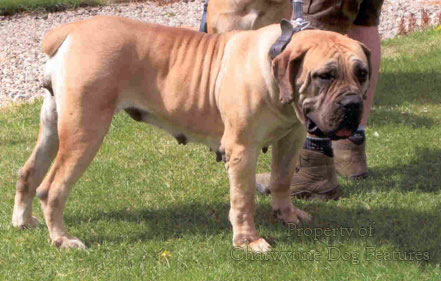
Which, of my three neighbours, is being the cruellest to their dog? The collie is ten years old, goes to work each day with the farmer and doesn't look starved of food. The small companion dog is five or six but has never enjoyed good health. The Labrador is only three years old but looks senile; I doubt if it will reach genuine old age, its movement is painfully laboured, its breathing heavy and distressing to see. But it clearly adores its owner, the one who is shortening its life! All three dogs have a restricted quality of life. In each case this is caused solely by the owner. Is cruelty inflicted with a smiling face still not cruelty?
On mainland Europe, concern over dog welfare has resulted in the much-criticised ETS 125 or European Convention for the Protection of Pet Animals. This Convention, presented under Articles 5, 10 and 15, aims to counter the harm inflicted on dogs by breeders in pursuit of human whim. It seeks to have those breeding policies changed where dogs deliberately bred for great size and weight or, conversely, for sheer tininess, suffer the consequences. It wishes to stop the breeding of dogs with such long backs and abbreviated legs that they suffer from disorders of the vertebral column. It wishes to stop dogs being caused discomfort from the extreme shortness of their muzzles. It seeks the discontinued breeding of animals carrying semi-lethal genetic factors or recessive defect-genes.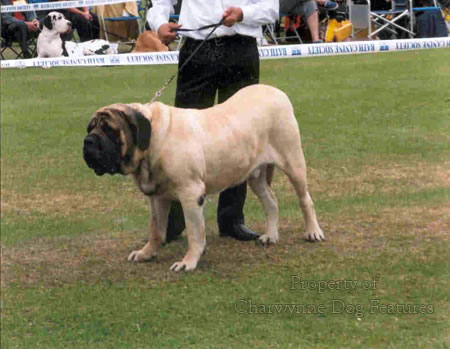
Those who see their livelihood or hobby threatened by Britain signing up to such legislation have seized on some other aspects such as cropping, docking, discontinued breeding of merle dogs and hairless dogs to lobby for non-compliance in Britain. I am strongly against ear-cropping but not opposed to docking, mainly because there are so many much more important threats to dog's health than the length of its tail and I'd rather focus on them. At the risk of sounding superior, I nevertheless take the view that we have a moral duty to subject creatures, whether they are battery hens, crated calves raised for veal or breeds of dog. I am saddened and amazed that veterinary surgeons, who see the harm done to dogs by breeders every day, don't speak up.
Small animal vets are under no obligation to report inherited defects or exaggerations in breed design which cause suffering in dogs. I understand that the RSPCA has never prosecuted a breeder who has knowingly and intentionally bred a dog with inheritable features which cause pain and suffering. If those in the animal welfare business do nothing to reduce suffering in such cases, is it not unsurprising if politicians stick their oar in? There is a moral vacuum here and I support any group which fills it. You shouldn't have to persuade dog breeders to change their ways; but those who claim to love a breed are often the ones causing the greatest pain in their dogs.
I have read accounts in the dog press of outraged breeders accusing 'Brussels' of trying to destroy their particular breed. Some people actually prefer dogs with harmful exaggerations! They often claim that 'breed type' is being threatened by interfering meddling bureaucrats from the EC. But when you point out that in breeds of dog with a closed gene pool exaggerations always exaggerate themselves and that their dogs are, as a breed, quite unlike their ancestors, arguments about precious breed type seem to disappear. It is simply irrefutable that in many breeds in the last century, short legs got even shorter, long ears got even longer, short muzzles got even shorter and long backs got even longer. When any desired feature inflicts discomfort on the dog, it ceases to be a breed feature and becomes a breed liability. 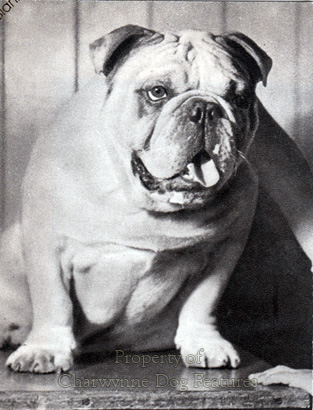
I am suspicious of vets who don't hesitate to castrate a dog but aspire to ethical objections over docking a tail. Moral vanity is usually dishonest and highly subjective. I am more than suspicious of dog breeders who protest loudly about a perceived threat from Brussels to their breed -- and then breed dogs with harmful exaggerations! When I see breeds struggling to cope with legs which are too short and backs which are too long I welcome legislation from anywhere which enhances the quality of life of future members of that breed. When I see breeds which regularly feature red-raw eyes from excessive haw I look forward to interference from Brussels. We have a duty to dogs ahead of any duty to breeds.
A few days before writing this, I held one of my precious dogs as he was humanely destroyed to prevent further suffering. He had lymphomas, a form of cancer involving the lymph nodes. Nine months before, he had, by the welcome he gave me when I myself came home after major surgery for cancer, spurred my own recovery. I had a major advantage over him. I knew that my father and brother had died of cancer and an early diagnosis was sought. In dogs, despite the careful recording of pedigrees, there is no system for recording causes of death in breeds, for identifying prevalent diseases in dogs at any one time or for notifying owners of areas of infectious diseases. If I had known what my dog's ancestors and litter mates had died of then earlier diagnosis would have been possible. Deaths from cancer in some breeds are alarmingly high but puppy purchasers are rarely informed of this.
In agriculture there is a system of 'notifiable diseases' under which outbreaks have to be reported to the government department concerned or the police. In this way, diseases such as fowl pest, anthrax, swine fever and foot and mouth disease can be isolated. There is no such system for domestic animals, despite the highly infectious nature of ailments such as parvovirus and kennel cough. Your local boarding kennels can be a source of such infections and yet have no need to report it. How many dogs have died or suffered needlessly because no measures have ever been established to try to limit the spread of infection? Perhaps 'Brussels' needs to act!
Indirect cruelty, cruelty through indifference, recklessness or dishonourable actions, kills more dogs than appalling acts of direct cruelty, which are so easy to spot as well as quick to arouse anger. But the indifference of most breed clubs towards the health of their breed, the recklessness of so many breeders who simply do not care about the genetic health of their dogs and the dishonourable way in which inheritable diseases are concealed undermine the pure-bred dog business. When I proposed the introduction of a health scheme for my breed club, it was voted out at the subsequent AGM. Less than half the recognised breeds have health surveys conducted in them. The Kennel Club, to its credit, is trying to rectify this.
Where are the people who tell you how much they love their breed in such schemes? Too busy discussing judging appointments, show trophies and committee posts probably! Why should the KC have to pressurize breed clubs into taking more interest in the health of their dogs? Why should anyone have to shame the veterinary profession into recording diseases breed by breed, so that some kind of data-base is established. Whenever I challenge vets on this issue I meet the same limp excuse: Who is going to collate this information? Is there not one determined individual in the veterinary profession who could draw up a national scheme, with support from canine charities and pet food manufacturers, to set up a scheme?
When as a teenaged kennel boy I worked for my local vet, inheritable diseases were not a talking point; now they present a threat -- to the very future of some breeds. Attitudes to cruelty have changed too in that time. I watched innumerable tom cats being neutered by the vet: it took a couple of seconds, two quick incisions, two brief miaows and back to the waiting room. Anaesthetics were not used. It is now obligatory to use an anaesthetic when castrating cats, under The Protection of Animals (Anaesthetics) Act, 1964; one of my colleagues recently lost a beautiful young male cat, not to the surgery of castration but to the anaesthetic. A cruel death.
In the 19th century, it was acceptable to talk of 'breaking' horses and dogs, especially gundogs. It is an expression I have never been happy with. It suggests the use of force, the imposition of will and little consideration for the animal being trained. Horse-whispering not only sounds better but works better. My father took horses into battle in the Great War and my brother's regiment took their horses with them when going off at the start of the Second World War. Both changed their minds about Army methods of training horses as a result of personal experiences. Many who have seen gundogs trained professionally in days gone by have had similar conversions.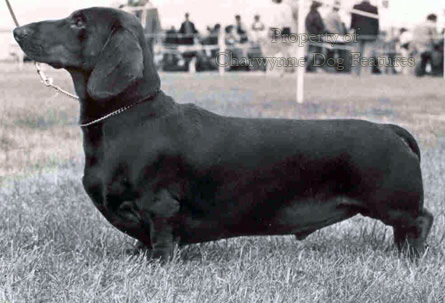
In his 'Dog Breaking' of 1915, "Wildfowler" wrote: "The whip should be resorted to only if the dog is very wilful and obstinate...Any breaker can teach a dog to drop in two hours by simply 'flogging' it into him, but I don't call that training a dog, I call it breaking his spirit..." More recently, especially in the United States, gundogs have been trained and then controlled in the shooting field by way of electric collars. This means literally shocking the dog into compliance. Both this and the use of a whip tells you more about the trainer or handler than it does about the dog. Breaking a dog's spirit or inflicting pain to instil order is a quite unnecessary form of cruelty. Who on earth wants a 'broken' dog?
We have largely outlawed the use of the whip and the electric collar is condemned by most experienced gundog men. Direct cruelty outrages most people nowadays and often gets reported. Indirect cruelty is sadly not even noticed in its many forms. I know of breeders who have repeated matings known to have produced cleft palates, hare lips and crank tails. We have all met breeders who simply refuse to accept that they have carriers of inheritable defects in their stock. I have been told of one who even ignored cases of glaucoma and another who bred from dogs known to carry epilepsy. This is the worst type of 21st century cruelty.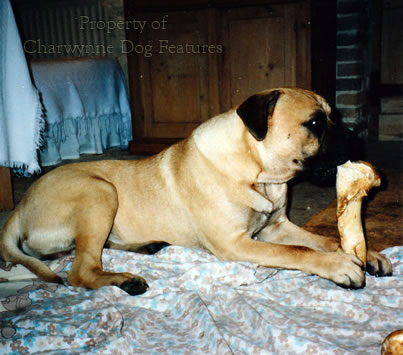
Our views on direct cruelty have changed for the better in the last one hundred years, although the incidence of reported cruelty remains depressingly high. Our views on indirect cruelty now need attention. It is easy to object to the use of electric collars, not so easy to insist that the agenda of your breed club's committee meetings has 'Breed Health' as a fixed item, high up on the agenda. Unless we face up to and then act to remedy 'cruelty by breeding' we put our precious companion dogs and indeed our precious breeds at risk.
It is time for all of us to show we care by speaking up when we see a dog literally being 'fed to death'. Any breed club which condones dogs being knowingly bred to a harmful design or with defective genes must change its ways. Everyone in animal welfare, vets especially, should press for the mandatory recording of essential data on breed health. Cruelty does indeed, as William Blake stated in his poem, have a human heart. 21st century cruelty may not come directly from whips and sticks but may be more life-threatening. We have the power to own and breed crippled dogs but surely the conscience not to; let's seek higher moral values and less moral vanity.